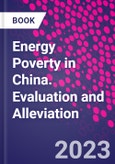Energy Poverty in China: Evaluation and Alleviation offers a thorough, methodological approach to energy poverty, which is a major obstacle in terms of the green or low-carbon transition of energy systems in China. The authors follow the framework of measurement, potential impact, and alleviation paths, supporting the design of effective energy and environmental policies for a globalized nation, especially considering the low-carbon transition of energy structures and energy poverty alleviation in the context of carbon neutrality.
The book begins by providing an overview of energy poverty, explaining the concept, summarizing the current situation globally and in China, and introducing the approach of the authors. The second chapter looks to build a comprehensive index system for the calculation of energy poverty in China. This is followed by three chapters that apply a range of methods to empirically assess the economic, environmental, and social effects of energy poverty. Individual chapters then explore specific alleviation paths, including digital economy, technological innovation, low-carbon energy transition, inclusive finance, and coal-to-gas/electricity policy.
This book is of interest to all those with an interest in energy poverty, energy and environmental policy, energy economics, carbon emission reduction, green growth, energy transition and renewable energy, including researchers, scientists, advanced students, engineers, R&D professionals, and policy makers or other experts at governmental or non-governmental organizations.
Please Note: This is an On Demand product, delivery may take up to 11 working days after payment has been received.
Table of Contents
1. An Overview of Energy Poverty
2. Comprehensive Evaluation of China's Energy Poverty
3. Economic Effect: Is Energy Poverty Eradication a Powerful Weapon for Green Growth?
4. Environmental Effect: Can Energy Poverty Alleviation in China Contribute to Carbon Neutrality?
5. Social Effect: Is Energy Poverty Alleviation the Panacea for Promoting Common Prosperity?
6. Alleviation Path I: Can Accelerated Digital Economy be an Effective Means for Energy Poverty Alleviation?
7. Alleviation Path II: Does Technological Innovation Help Address Energy Poverty?
8. Alleviation Path III: Can Low-carbon Energy Transition Solve Energy Poverty in China?
9. Alleviation Path IV: Can Improved Inclusive Finance Help Alleviate Energy Poverty in China?
10. Alleviation Path V: Is the Coal-to-gas/electricity Policy a Valid Strategy for Energy Poverty Alleviation?
Authors
Kangyin Dong Associate Professor, School of International Trade and Economics, University of International Business and Economics, Beijing, China.Dr. Kangyin Dong is an Associate Professor in the School of International Trade and Economics, University of International Business and Economics, Beijing, China. His research interests include energy economics, climate change economics, and economics of natural gas and renewable energy. Dr. Dong serves for several academic journals as an Associate Editor including Energy Economics, Economic Analysis and Policy, Petroleum Science, and Journal of Economic Statistics. Dr. Dong has published more than 200 papers appearing in journals such as Energy Economics, Energy Policy, World Development, and The World Economy.
Jun Zhao School of Economics and Management, China University of Geosciences Beijing, China. Dr. Jun Zhao is a Lecturer in the School of Economics and Management, China University of Geosciences Beijing (Beijing, China). Her research interests include Energy Economics, Environmental Economics, and Energy System Resilience. Dr. Zhao has published 40 papers appearing in journals such as Energy Economics, Renewable Energy, Energy, and Renewable & Sustainable Energy Reviews. Xiucheng Dong Professor, School of International Trade and Economics, University of International Business and Economics, Beijing, China. Dr. Xiucheng Dong is a Professor in the School of International Trade and Economics, University of International Business and Economics, Beijing, China, the Director of the UIBE Belt & Road Energy Trade and Development Center, and the Executive Director of the China International Low Carbon Economy Research Institute of the University of International Business and Economics. He also serves as Vice President of the China Petroleum Circulation Association, Vice Chairman of the China Energy and Resources System Engineering Association, Member of the Consultative Committee of Price Experts of the National State Development and Reform Commission, Special Expert of China National Energy Agency, Standing Director of China Energy Association and China Market Economy Research Association of Geology and Mineral Economics, and Special Commentator for CCTV. Dr. Dong additionally provides long-term strategy and policy advisory services for national energy government agencies, participating in drafting and argumentation of many national energy reform and policy documents.







